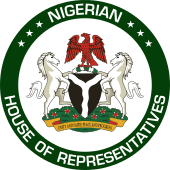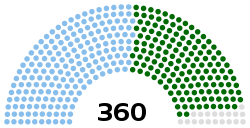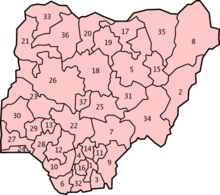House of Representatives (Nigeria)
The House of Representatives is the lower chamber of Nigeria's bicameral National Assembly. The Senate is the upper chamber.
House of Representatives | |
|---|---|
| 9th National Assembly | |
 | |
| Type | |
| Type | Lower Chambers of the National Assembly of Nigeria |
| Leadership | |
Deputy Speaker of the House of Representatives | |
| Structure | |
| Seats | 360 |
 | |
Political groups | Majority
Minority
|
| Elections | |
| First-past-the-post | |
Last election | February 2019 |
| Meeting place | |
 | |
| Abuja | |
| Website | |
| http://www.nass.gov.ng | |
 |
|---|
| This article is part of a series on the politics and government of Nigeria |
|
Judiciary |
|
|
|
The House of Representatives has 360 members who are elected in single-member constituencies using the plurality (or first-past-the-post) system. Members serve four-year terms. The Speaker of the Nigerian House of Representatives is the presiding officer of the house.
Nigerian state delegations
The Constitution of the Federal Republic of Nigeria, assumes a National Assembly for the federation which consist of a senate and a House of Representatives. The senate consist of three (3) senate members from each Nigerian state and one senate member from the Federal Capital Territory, Abuja. There must be three hundred and sixty (360) members in total, representing constituencies for the Federal House of Representatives.[1]
|

|
Defection of some members in 2018
A group of 37 House members of Nigeria’s ruling party, the All Progressives Congress defected to opposition parties in 2018 underscoring rising political tensions due to the upcoming election in 2019. 33 members defected to the major opposition party, People's Democratic Party, while four defected to African Democratic Congress (ADC).[2]
Members (since 1979)
- List of members of the House of Representatives of Nigeria, 1979–1992
- List of members of the House of Representatives of Nigeria, 1992–1998
- List of members of the House of Representatives of Nigeria, 1998–1999
- List of members of the House of Representatives of Nigeria, 1999–2003
- List of members of the House of Representatives of Nigeria, 2003–2007
- List of members of the House of Representatives of Nigeria, 2007–2011
- List of members of the House of Representatives of Nigeria, 2011–2015
- List of members of the House of Representatives of Nigeria, 2015–2019
- List of members of the House of Representatives of Nigeria, 2019-2023
Party leaders
Party leaders and whips are elected by their respective parties in a closed-door caucus by secret ballot. With the APC holding a majority of seats and the PDP holding a minority, the current leaders in the 8th National Assembly are: Majority Leader Femi Gbajabiamila, Chief Whip Ado Garba Alhassan, Minority Leader Ogor Okuweh, and Minority Whip Umar Barde Yakubu.[3]
See also
- History of Nigeria
- Legislative branch
- List of national legislatures
- Nigerian First Republic
- Nigerian Second Republic
- Nigerian Third Republic
- Nigerian Fourth Republic
References
- "composition of National assembly"http://www.waado.org/NigerDelta/ConstitutionalMatters/1999Constitution/ChapterFive.html
- Nsisak Nseyen. "37 Reps Dump APC; 33 cross to PDP". Retrieved 24 July 2018.
- "Principal Officers of The House of Representatives". Archived from the original on 21 April 2018. Retrieved 20 April 2018.